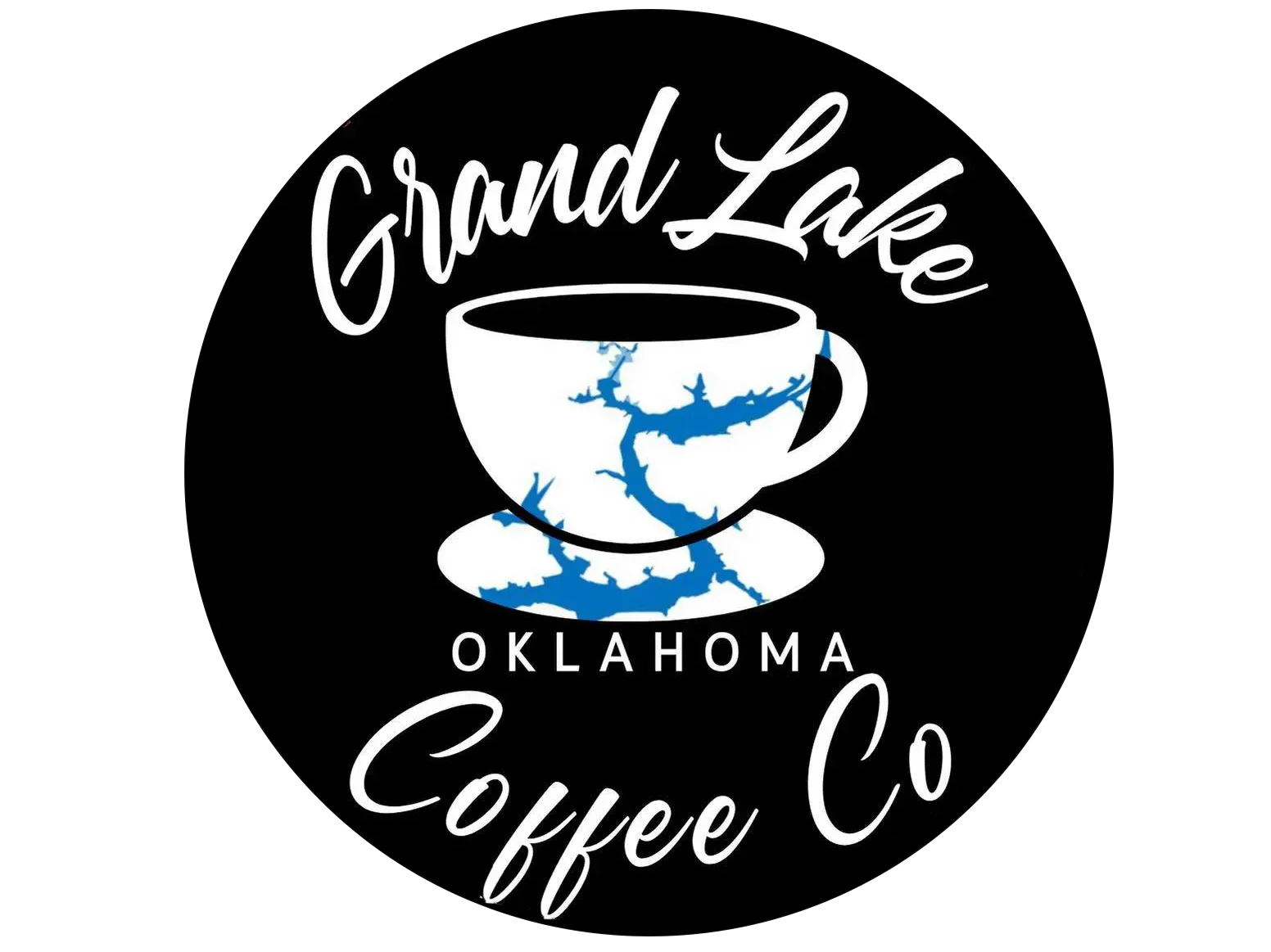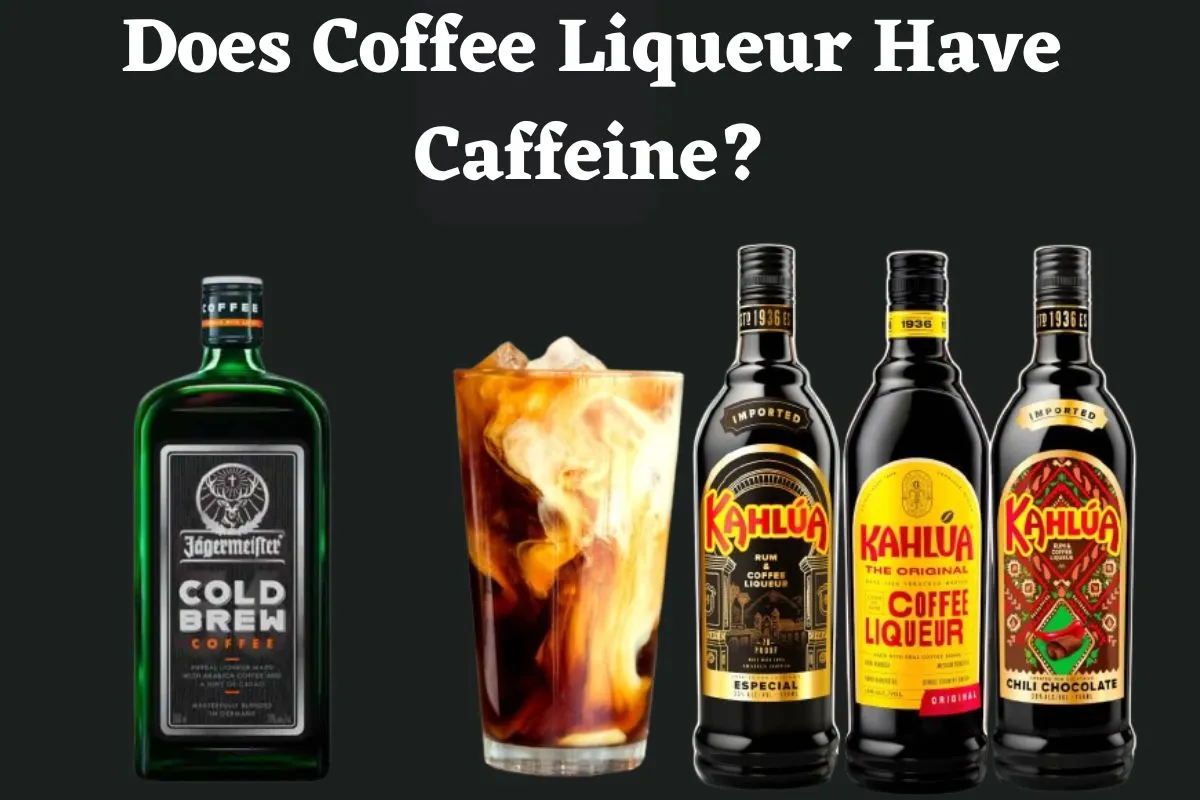Did you know the rich, sweet coffee liqueur you love in your Espresso Martini has its roots in ancient Mexico? While a delicious way to add a coffee kick to your cocktails, the origins of this popular drink raise a common question: Does coffee liqueur have caffeine?
Let’s dive in and discover if your favorite coffee-infused indulgence might also be giving you a little energy boost.
Importance of Knowing Content in Coffee Liqueur
Coffee liqueur, a sweet, coffee-flavored alcoholic drink, is enjoyed both internationally and nationally in a variety of settings and forms. It can be consumed neat, mixed in cocktails, or even used as a flavor enhancer in desserts and other culinary creations.
Brands like Kahlúa and Tia Maria are among the most recognized, offering consumers a blend of coffee and alcohol that is both rich and aromatic.
One of the primary benefits of coffee liqueur, albeit indirectly related to caffeine, is its versatility in mixology and gastronomy. It can add depth and complexity to cocktails and dishes, appealing to those who appreciate the flavor of coffee integrated with alcoholic and non-alcoholic beverages and foods.
However, it’s essential to consider the caffeine content for those sensitive to caffeine or who wish to avoid its stimulating effects, especially later in the day.
Some people mistakenly assume that coffee liqueur contains a negligible amount of caffeine, while others may overestimate it. That’s why understanding the factors influencing caffeine levels in coffee liqueur is crucial. The type of coffee beans used, the brewing method, and the final alcohol percentage all play a role.
Due to its caffeine content, it’s particularly important for those sensitive to caffeine, pregnant or breastfeeding individuals, and anyone on medications that might interact with caffeine to limit or avoid coffee liqueur consumption. Knowing the possible caffeine content empowers you to make informed decisions about this popular beverage.
Does Coffee Liqueur Have Caffeine
Yes, coffee liqueur has caffeine. Most coffee liqueurs, such as Kahlúa and Mr. Black, are made by mixing coffee with liquor and other flavorings like sugar, vanilla, or spices, thus naturally incorporating caffeine into their composition. The caffeine content is mostly influenced by the type of coffee used, the production process, and whether the product is labeled as decaffeinated or not.
For instance, Kahlúa, one of the most recognized brands, contains about 5 milligrams of caffeine per 1.5-ounce serving, which is relatively minimal compared to the 200 milligrams found in an 8-ounce cup of brewed coffee.
On the other hand, brands like Mr. Black offer a higher caffeine content, with 25 milligrams per 1.5-ounce serving, catering to those who desire a stronger coffee flavor and the accompanying caffeine kick.
There are also decaffeinated coffee liqueurs available for those sensitive to caffeine or looking to avoid it, such as Richardo’s, which is specifically marketed as a decaf option.
However, it’s crucial to note that while the caffeine content in coffee liqueur is generally lower than that of a regular cup of coffee, it can still affect individuals sensitive to caffeine.
Given the variation in caffeine content across different brands and products, it’s advised to check the label or product description if you’re concerned about caffeine intake. Brands like Kahlúa, Tia Maria, and Patron XO Café are among those that offer caffeine-free or low-caffeine options.
Coffee Liqueur Variants and their Caffeine Content
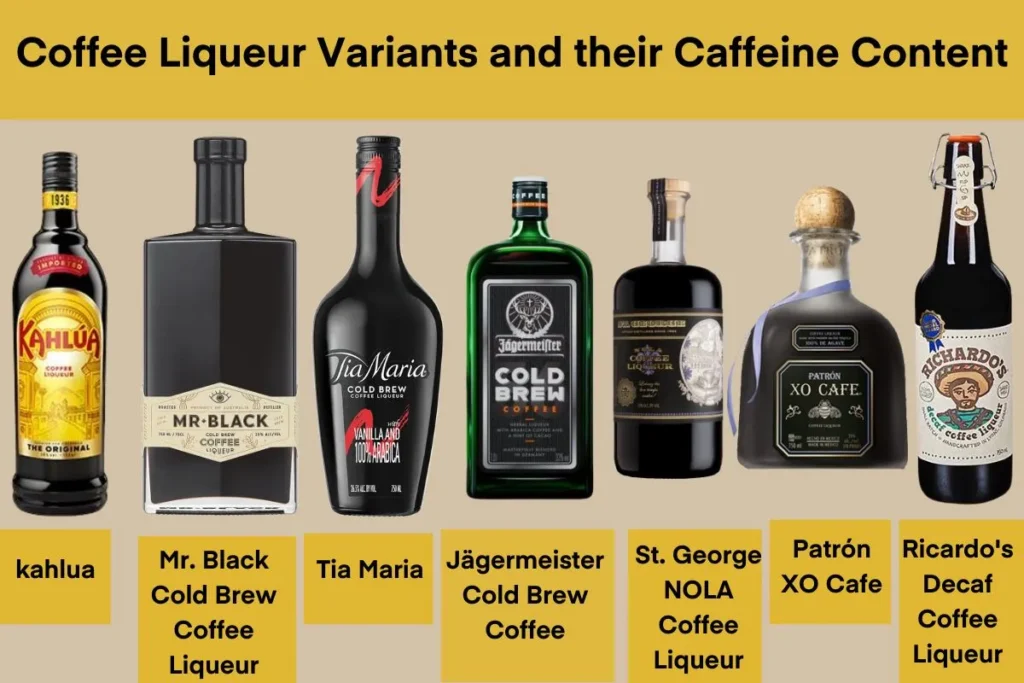
These liqueurs, adored for their robust coffee flavors intertwined with the complexity of alcohol, offer a unique experience for both coffee enthusiasts and liquor connoisseurs.
- Kahlúa, hailing from Mexico, stands out as a quintessential coffee liqueur, cherished for its rich blend of Arabica coffee beans, rum, vanilla, and caramel. With approximately 5 milligrams of caffeine per 1.5-ounce serving, it offers a gentle caffeine touch, allowing enthusiasts to savor its coffee essence without significant stimulation. This makes Kahlúa a versatile component in cocktails like the White Russian and Espresso Martini, or simply enjoyed neat for a soothing evening indulgence.
- Mr. Black Cold Brew Coffee Liqueur marks its presence with a robust coffee flavor, attributable to the cold-brewed Arabica beans and Australian wheat vodka it’s crafted from. Originating from Australia, it boasts a higher caffeine content of about 25 milligrams per 1.5-ounce serving, catering to those seeking a pronounced coffee experience in their liqueur choice. Its artisanal approach underscores a commitment to quality and flavor, positioning Mr. Black as a premium choice for coffee liqueur aficionados.
- Tia Maria is a liqueur that combines Jamaican Blue Mountain coffee beans with Jamaican rum and a hint of vanilla. Its caffeine content is minimal, around 0.5 milligrams per 1.5-ounce serving, allowing for a rich coffee taste with scarcely any caffeine impact. This liqueur finds its place in various cocktails or serves as a delightful sipper on its own, offering a taste of Jamaica’s renowned coffee without the wakefulness.
- Jägermeister Cold Brew Coffee ventures into unique territory by blending the traditional herbal liqueur with Arabica coffee and a touch of chocolate, creating a bold flavor with a caffeine kick of about 33 milligrams per 1.5-ounce serving. This German concoction appeals to those who appreciate the depth of Jägermeister enhanced with the richness of coffee, offering a multifaceted drinking experience.
- St. George NOLA Coffee Liqueur pays homage to New Orleans’ coffee culture, using a mix of Brazilian and Ethiopian beans, chicory root, vanilla, and cacao nibs. Its caffeine content sits at approximately 10 milligrams per 1.5-ounce serving, providing a balanced blend of flavors that’s both smooth and complex, ideal for those who enjoy the subtleties of coffee nuances.
- Patrón XO Cafe from Mexico brings a tequila twist to the coffee liqueur scene, merging Patrón Silver tequila with fine coffee. The caffeine content is not explicitly stated but is presumed to be on the lower end, focusing more on flavor rather than a caffeine boost. This dry liqueur is not overly sweet, making it a sophisticated choice for tequila and coffee lovers alike.
- Ricardo’s Decaf Coffee Liqueur offers a decaffeinated alternative, perfect for those looking to avoid caffeine altogether. Made with high-quality decaf beans, sugar, and Sambuca, it ensures a rich coffee flavor that can be enjoyed at any time without concern over caffeine content.
List of Ingredients in Coffee Liqueur
Depending on the brand and formula, coffee liqueur’s ingredients might change, however standard components usually consist of:
- Coffee Beans or Coffee Extract: The primary flavoring agent in coffee liqueur is derived from coffee beans or concentrated coffee extract. This provides the rich, robust coffee flavor that is characteristic of the liqueur.
- Sugar or Syrup: Sweetness is an essential component of coffee liqueur, so sugar or syrup is often added to balance out the bitterness of the coffee.
- Base Spirit: Most coffee liqueurs are produced using a base liquor, including brandy, rum, or vodka. This alcohol adds to the overall flavor of the liqueur and acts as a solvent for the flavors extracted from the coffee beans.
- Flavorings: Additional flavorings may be added to enhance the complexity of the liqueur. This can include ingredients such as vanilla, chocolate, caramel, or spices, which complement the coffee flavor and add depth to the liqueur’s profile.
- Water: Water is often used to dilute the ingredients and adjust the final alcohol content of the liqueur. It also aids in achieving the mouthfeel and consistency that are desired.
- Preservatives: Preservatives are sometimes added to commercial coffee liqueurs in order to increase shelf life and preserve freshness. Sodium benzoate and potassium sorbate are common preservatives.
- Coloring Agents (Optional): To achieve a consistent and appealing color, some coffee liqueurs may contain coloring agents. This is particularly common in mass-produced varieties where uniformity of appearance is desired.
Coffee Liqueur Nutritional Information
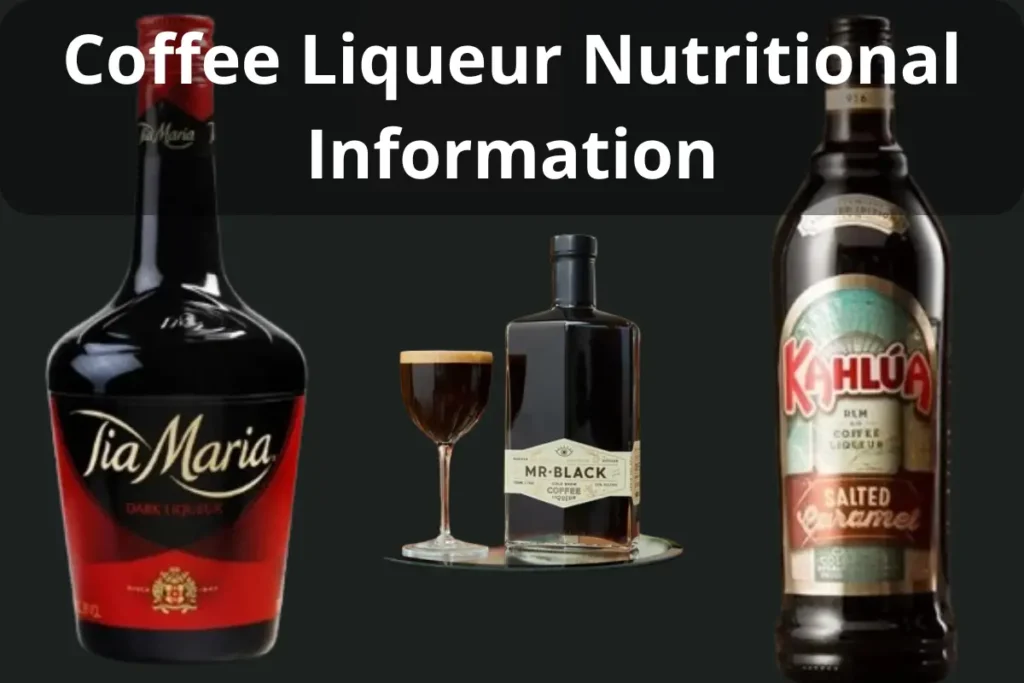
Coffee liqueur, while delicious, is primarily a treat rather than a health-focused beverage. A standard serving size of 1 fluid ounce (35 grams) contains around 107 calories, mainly derived from its significant sugar content (11 grams). It has minimal fat (0.1g) and offers no dietary fiber or protein.
Additionally, coffee liqueur contains trace amounts of sodium (2.8mg) and potassium (10.4mg), along with a small amount of caffeine (around 9mg). It’s important to keep these nutritional facts in mind when incorporating coffee liqueur into your diet.
| Nutrition Facts | Coffee Liqueur |
| Serving Size | 1 fl oz (35 grams) |
| Calories | 107 |
| Total Fat | 0.1g (0% DV) |
| – Saturated Fat | 0g (0% DV) |
| – Trans Fat | 0g |
| – Polyunsaturated Fat | 0g |
| – Monounsaturated Fat | 0g |
| Cholesterol | 0mg (0% DV) |
| Sodium | 2.8mg (0% DV) |
| Total Carbohydrates | 11g (4% DV) |
| – Dietary Fiber | 0g (0% DV) |
| – Sugars | 11g |
| Protein | 0g |
| Calcium | 0.4mg (0% DV) |
| Iron | 0mg (0% DV) |
| Potassium | 10.4mg (0% DV) |
| Caffeine | 9mg |
Alternatives to Coffee Liqueur and their Caffeine Content
For those seeking the rich, bold flavors of coffee liqueur but interested in alternatives with a similar taste profile and curious about their caffeine content, several options offer the desirable coffee essence.
Espresso Vodka:
Infused with real espresso or coffee flavors, this vodka variant captures the essence of coffee. Brands like Van Gogh Espresso Vodka don’t widely advertise their caffeine content, but given the use of real espresso, there’s likely a modest amount of caffeine present, comparable to a small shot of espresso (approximately 30-50 mg per serving, depending on the brand and concentration of espresso).
Coffee-Flavored Rum:
With a sweet and slightly spiced coffee experience, coffee-flavored rums incorporate the richness of coffee. The caffeine content will be lower than an actual coffee drink but could range from 5-10 mg per serving, depending on how strongly coffee-infused the rum is.
Coffee Beer (Stout or Porter):
Craft breweries often produce stouts and porters with a coffee infusion. The caffeine content in these beers can vary significantly based on the brewing process and the amount of coffee used. On average, a coffee beer might contain anywhere from 5 to 100 mg of caffeine per 12 oz, with the higher end for those specifically marketed as coffee-forward.
Non-Alcoholic Coffee Syrups:
These syrups provide a coffee flavor without alcohol and without a significant amount of caffeine. However, some coffee-flavored syrups might contain minimal caffeine amounts, typically less than 5 mg per serving, primarily if real coffee or coffee extract is used in the syrup.
Coffee-Flavored Tea:
Teas infused with coffee beans offer a lighter alternative, with caffeine content potentially mirroring that of black tea or slightly higher due to the coffee infusion. Expect around 40-70 mg of caffeine per cup, depending on the tea blend and the brewing time.
Homemade Coffee Extract:
Creating a coffee extract involves infusing vodka or another neutral spirit with coffee beans. The caffeine content in homemade coffee extract will depend on the coffee-to-spirit ratio and the steeping time. It could range significantly but expect it to be less concentrated than straight espresso due to dilution.
| Alternative | Caffeine Content |
| Espresso Vodka | Varies |
| Coffee-Flavored Rum | Varies |
| Coffee Beer (Stout or Porter) | 5-100 mg per 12 oz |
| Non-Alcoholic Coffee Syrups | 0 mg |
| Coffee-Flavored Tea | 20-60 mg per 8 oz |
| Homemade Coffee Extract | Varies |
Recommended Daily Intake of Coffee Liqueur
The recommended daily intake (RDI) of caffeine for healthy adults is 400mg. Compared to this, a single serving (1 fluid ounce) of coffee liqueur contains roughly 9mg of caffeine. This means one serving accounts for only around 2.25% of your daily caffeine allowance.
However, it’s important to remember that multiple servings of coffee liqueur, or combining it with other caffeinated beverages, can quickly add up. Caffeine sensitivity is individual, so be aware of your overall intake, including coffee liqueur, especially if you experience any negative effects from caffeine.
Conclusion
Does Coffee Liqueur Have Caffeine? Coffee liqueur does indeed contain caffeine. Although the levels may be lower than a standard cup of coffee, it’s crucial to be mindful of this fact. Understanding your caffeine tolerance and monitoring your overall consumption is key to responsible enjoyment.
Whether you savor coffee liqueur in cocktails, enhance desserts, or enjoy it as an after-dinner indulgence, this knowledge allows for informed decision-making and a more balanced approach to its consumption.
Frequently Asked Questions:
Q1. What kind of alcohol is coffee liqueur?
Coffee liqueur is typically made with a rum or neutral grain spirit base. Rum adds a touch of sweetness and warmth, while neutral grain spirits allow the pure coffee flavor to shine. The alcohol in coffee liqueur acts as a solvent, extracting the rich coffee flavors and preserving them in the final product.
Q2. Does coffee liqueur taste good?
Most people find coffee liqueur quite delicious! It offers a delightful balance of the robust, slightly bitter flavor of coffee with a pleasant sweetness. Many brands also include additional flavor notes like vanilla, chocolate, or other spices, adding complexity and depth.
Q3. Is coffee liqueur good by itself?
While the caffeine content in coffee liqueur is lower than a standard cup of coffee, it still contains a noticeable amount – typically around 5-10mg per ounce. For those sensitive to caffeine, consuming coffee liqueur, especially close to bedtime, could potentially disrupt sleep patterns.
Q4. Does coffee liqueur keep you awake?
While the caffeine content in coffee liqueur is lower than a standard cup of coffee, it still contains a noticeable amount – typically around 5-10mg per ounce. For those sensitive to caffeine, consuming coffee liqueur, especially close to bedtime, could potentially disrupt sleep patterns.
Q5. Can you get addicted to coffee liqueur?
While coffee liqueur itself is generally not considered addictive, it’s important to exercise moderation due to its alcohol content and the potential presence of caffeine. Regular, excessive consumption of alcohol-containing beverages can lead to health concerns and, in some cases, dependence. It’s best to enjoy coffee liqueur as an occasional treat rather than a daily habit.
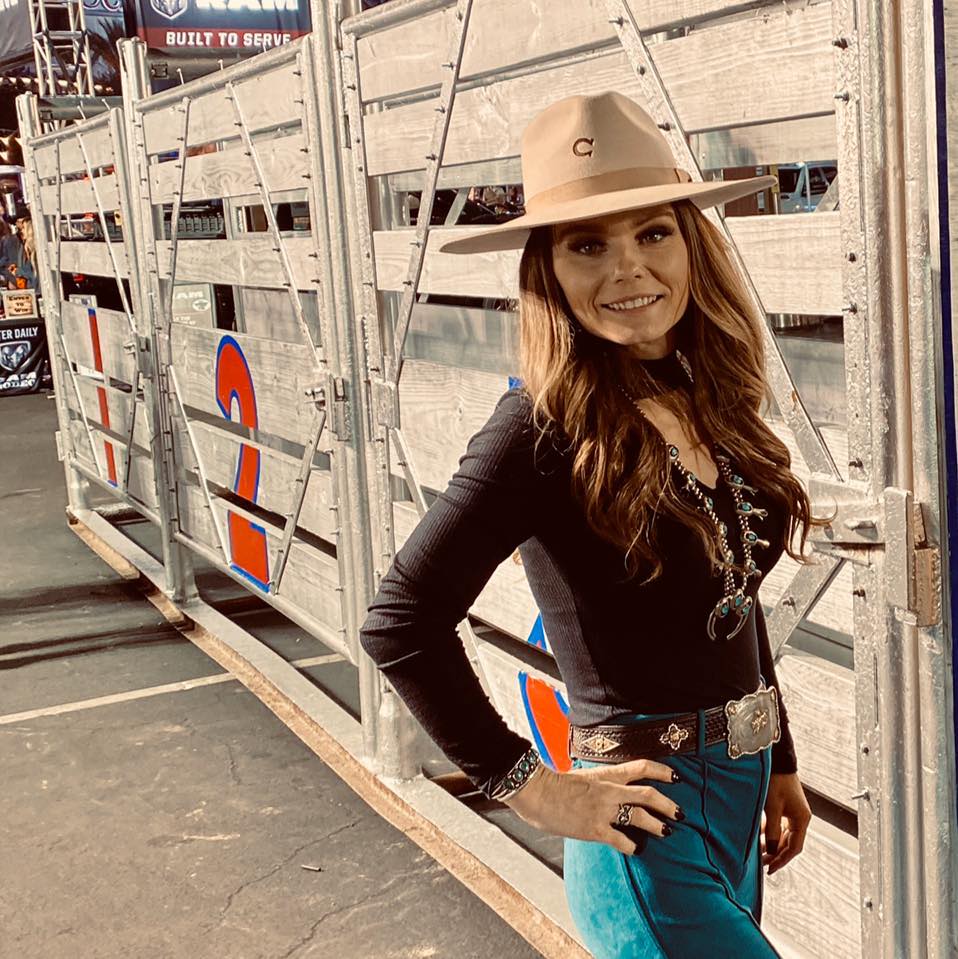
Rossi Glover, the passionate Owner of Grand Lake Coffee, infuses every cup with her love for coffee and dedication to quality. With an extensive background in the art and science of coffee, Rossi is not just a connoisseur but a storyteller, sharing the intricate tales behind each brew.
